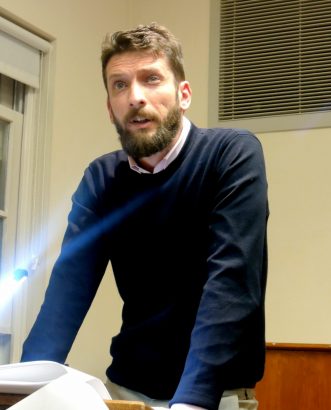Written shortly before yesterday’s long anticipated break-up of the Israeli government, Jack Omer-Jackaman argues that leftists like himself will look back on the year-long coalition as a blessed interregnum.
The collapse of Israel’s coalition government is surely imminent. Nir Orbach’s defection has brought it another step closer, despite his promise not to vote with the wreckers for its dissolution, should such a vote occur this week. If my more obstinate and uncharitable comrades will balk at even so muted a requiem as I will offer here, many others will join in my melancholy, recognising with me that the collapse of the 36th Government of Israel would mark the failure of a bold experiment and may auger the re-conquest of the Knesset by the Likud and its even more extreme allies.
Two Cheers for the Coalition
If the Bennett-Lapid government’s achievements have been mostly symbolic – it has hardly had time for to establish a glittering legislative CV – then so be it; in this time and in this Israel, symbols matter; in an epoch in which the religious right is fomenting hatred against both the gay and Arab-Israeli communities, the mere presence of an openly gay party leader (and minister) and an Arab-Israeli party in a governing coalition matters.
One can, in fact, cite concrete accomplishments in the coalition’s defence. It has passed a three-years delayed budget and overseen significant deficit reduction (recently reduced to near zero for the first time in 14 years). Late-period Covid was skilfully handled, as was an increased multilateralism, most notably including infinitely improved relations in the US which were, beyond the Trumpists, severely strained by a decade of Netanyahu’s anti charm offensive. Lapid and Bennett’s assessment that persuasion, rather than diplomatic scorched earth, will ensure vital US cooperation on Iran is wise and mature. Add to these the not inconsiderable fact that it has handled Gazan provocation with relative restraint and been rewarded, not with the carnage promised by Netanyahu, but with similarly relative quiet (for which Bibi, of course, claims retrospective credit).
But certainly, this government was of primary value for its symbol of counter-cultural cooperation, and not because its members suddenly embraced one another and agreed on everything, but precisely because they so visibly did not. To the contrary, their differences and antipathies were on open and vivid display. And, in spite of the fact that under this government the occupation has become not one inch less entrenched, in trying to normalise the notion that one can work with one’s enemies in a shared endeavour for the common good a valuable model was being shown to Israeli voters. If the day ever comes when the dial is shifted on the conflict from the Israeli side, it will be the result of just such a quixotic amalgamation as this. As such, its internal collapse is a fitting occasion for lamentation.
This sadness is no less acute for being accompanied by a grim sense of inevitability. One would like to declaim with the poet that ‘of all sad words of tongue or pen, the saddest are these, “It might have been”’. Alas, the clock was always ticking on this alliance. However tireless Yair Lapid’s mature and commendable ministrations, too many involved – perhaps even Israel itself – could not be trusted with so grownup and ecumenical an arrangement. Even in a political culture as familiar with coalitions as Israel, one cannot govern for long when reliant on a shared antipathy to Benjamin Netanyahu and the whims of capricious members.
I certainly concede that Bennett was, and remains, a most unlikely candidate for unifier-in-chief. A champion of the settlers and an avowed opponent of the two-state solution, he was previously, and justly, anathema to progressives. But critics to his left must now acknowledge, he has distinguished himself in the last year by a political sobriety and sacrifice of which I would not have dreamed him capable. There is something of Menachem Begin about his holistic (to a point) conception of Israeli society, an aspect of the Revisionist legacy stripped from the Likud by Netanyahu. Where the latter would gladly watch Israel’s liberal accomplishments – indeed, its very sense of itself as a democracy – burn if it would advance his personal agenda, Bennett has shown himself – however much I object to his worldview – a true patriot and, that rarest of things, a serious man. It was impossible, for example, to watch his response to hecklers at Yad Labanim on Remembrance Day and not conclude that this was, at the very least, a bona fide statesman; the contrast with his predecessor never more striking.
I was also, if not wrong, then a little harsh on Lapid, too, having always considered him an empty shirt, the typical too-handsome politician of many pleasant words but with nothing to say, coasting on his father’s considerable legacy. He, too, has shown himself a man possessed of an almost indefatigable zeal in holding this thing together. Israeli leftists I have spoken to over the last year have found themselves grudgingly but assuredly impressed by the pair of them.
In defence of Ra’am
The coalition rightists are declaring publicly that it is the ‘anti-Zionism’ of Ra’am and (some in) Meretz that has caused the crisis. Bennett, commendably, is not following the weathervane and turning to Ra’am-bashing. It was moving to witness him, during a humiliating Knesset session called by the Likud to force him to justify the coalition’s record, respond to Bibi’s goading of his partnership with Abbas not with embarrassment but with an unapologetic defiance. Abbas’s wider politics are not to my taste, and those of his movement even less so. But this is a man who has publicly confirmed the legitimacy of Israel as a Jewish State – the perennial and not unreasonable requirement of ‘acceptable’ Palestinians and Arab-Israelis – and has also publicly refuted the charge of ‘Israeli apartheid’. He has unmistakably played his part in this coalition in earnest and good faith, and not as the fifth columnist of the racists’ fevered imagination.
And while it is also fair for an angry Gideon Saar (head of the New Hope Party) to point out to recalcitrant Ra’am (and Meretz) MKs that only unified voting discipline can sustain the coalition, Orbach’s couching of it in ‘anti-Zionist’ terms spells danger for the chances of any involvement of Arab-Israeli parties in future coalitions. If demanding that Israel’s 20 per cent Arab (largely Palestinian) minority follow not only Abbas’s conciliatory position – no small ask itself, in context – but become ardent Zionists as well does indeed become the standard, then the prospects of further meaningful collaboration, at whatever level, look bleak.
Abbas was quite open about his own motivations for committing Ra’am to the coalition. ‘The very act of our participation in this government and in this political process’, he said at the time, ‘brings … calm to the region, a feeling of hope, that it’s possible to live together … we focus on the issues and problems of the Arab citizens of Israel within the Green Line. We have cardinal problems: crime, violence, economic distress, severe lack of housing, unrecognised villages in the Negev. We want to heal our own problems.’
Arab-Israeli politicians, he argued, had long stuck to the path of principled disengagement, and it had not much improved the lives of their struggling constituents. And, for all the knocks that he has sacrificed too much, Abbas has succeeded in achieving unprecedented infrastructural and police investment in Arab areas, as well as the recognition of a handful of Bedouin villages. That crime and inequality in Arab neighbourhoods remain rampant is the product of a web of deeply complex factors, not a lack of effort on his part.
Why No Third Cheer
One can, of course, regret the coalition’s impending demise without romanticising it. Being a group of human beings, it is possessed of its fair share of ineptitude, mediocrity, and mendacity. Posterity will not soon forgive its equivocation on Ukraine, though lord knows it is in plentiful if indecent company there, and with better reasons than most for its inaction. Its (re)authorisation of the Flag Day march’s route through the Muslim Quarter was dangerous and irresponsible, and the suffering of local Palestinian residents at the hands of La Familia and Lehava thugs on its conscience (Defence Minister Benny Gantz’s willingness to designate these two stains on the nation as terrorist groups was welcome but a little late).
Beyond its multi-ethnic example, it has offered no new leadership on the conflict – there was no way it was ever going to – and has presided over a continuation of the pro-settlement status quo. See, for example, the approval of the eviction of 1,300 Palestinians living in eight villages in the South Hebron Hills in May or, most recently, its efforts to appease its own furthest-right flank by refusing to implement the Supreme Court’s command that illegal settlers be removed in Homesh. To some, therefore, it will be bitterly apt that the lost vote which may signal the beginning of the end was one relating so closely to the entrenchment of the occupation: the extension of Israeli law to settlers in the West Bank, approved by the Knesset every five years was voted down by the opposition and a few coalition defectors in early June. (Where else but in Israel, incidentally, would the right-wing in opposition vote against a bill with whose provisions it entirely agrees, while leftists in government vote in favour despite opposing it?)
The Crack Up
There is already much anger from Israeli progressives at the coalition members whose defections or withdrawals of support are playing perhaps the decisive role in its impending dissolution. The first cut – and probably, it turns out, the deepest – came when the coalition’s own whip, Yamina’s Idit Silman, walked out in April citing a determination to ‘express the stance of the majority of the Israeli public and establish a national Zionist government … ’. The precipitating factor in Silman’s decision seems to have been Health Minister Nitzan Horowitz’s (of Meretz) dangerously radical insistence that Israeli hospitals obey the law (affirmed by the High Court) and allow the bringing of hametz into their facilities. One senses that Silman was merely looking for a presentable opportunity to withdraw and can only imagine the glee in Netanyahu’s office when the news reached him; here was evidence, from one of their own, that this was a government of dangerous leftists and Arabs intent on the destruction of the Jewish character of the State of Israel.
Roughly conterminous with this, Bennett began to shed personal staff at an alarming rate. In the weeks since, he and Lapid have struggled, gamely, to keep inside the tent those recalcitrant leftist/Arab-Israeli members who insist that the coalition is being dictated to by the rightist factions and by rightists who aver that – you guessed it – the left is calling the tune and they never signed up for that.
Since we leftists are wont to devour our own first and most voraciously, most of the anger is currently directed at Meretz’s Arab-Israeli MK Ghaida Rinawie Zoabi. Zoabi quit the coalition – but crucially not the Knesset – a month ago, citing her colleagues’ response to the disturbances at al-Aqsa and the funeral of slain Al Jazeera journalist Sheerin Abu Akleh. ‘I cannot’, she said, ‘continue to support the existence of a coalition that in this shameful manner harasses the society I came from.’ Meretz’s leadership has joined the majority of the coalition factions in piling obloquy on Zoabi, insisting that if this is her position then she must, in good conscience, resign from the Knesset and be replaced by the next on the party list whose loyalty can, in turn, provide the coalition with a chance for survival. By not doing so, they argue, she is ensuring the collapse of this government and the likely return of one which will do far more damage to her society than that experienced in recent months; cue the gaggle of Meretzniks protesting outside her home in recent days, an alarmingly common occurrence in Israeli politics. Being troubled by about a one millionth share of her problems and, I suspect, possessed of an even smaller proportion of the fortitude and capacity for self-abnegation required of an Arab-Israeli woman in politics, I am not about to add my voice to the chorus.
After the Coalition, Bibi, Smotrich and Ben Gvir?
Nonetheless, All those departing the coalition must live with the consequences of their desertion. Predicting outcomes in Israeli politics makes fools of amateur psephologists far wiser than I, but the certain beneficiaries of the collapse of the government are Netanyahu and his allies. Though the current Knesset maths and contemporary polling still show him short of a majority willing to serve under him – and though he may still lack the votes required to succeed in a vote of no confidence – the defection to Likud of either individual disaffected rightists in the coalition or else whole factions like Saar’s New Hope would give what we must call his far-right bloc a shot at a workable government.
When not in court, either facing his own charges or else trading blows in his ongoing, and distinctly baroque, libel case against fellow former Prime Minister Ehud Olmert, Netanyahu has spent the past year relentlessly lambasting Bennett and Lapid for bringing dangerous terroristic Arabs into government, leaving out the occasions when he attempted to woo Abbas and Ra’am to join his own coalition. If, as I suspect, the situation augers his return to power, then leftists like me will surely in future recall this past year as a blessed interregnum.
I am afraid that two other beneficiaries of a collapse of the coalition will be Bezalel Smotrich and Itamar Ben Gvir. In addition to being an ardent and active opponent of gay rights, Smotrich is a dyed in the wool Jim Crow-style segregationist who would prohibit social and professional interaction between Jews and Arabs, the better to then extirpate the latter from the land. On a recent visit to Britain the Board of Deputies memorably and commendably bid him go back whence he came. Ben Gvir is worse still; a disciple of Rabbi Meir Kahane, whose violent racism saw him banned by a right-wing Israeli government from running for the Knesset, Ben Gvir’s vision of Arab-Jewish relations is illustrated perfectly by the pride of place in his home given to a portrait of Baruch Goldstein, the killer of 29 Palestinians, some not even in their teens, in a massacre at the Cave of Patriarchs in 1994.
Polling puts the two men’s Religious Zionist bloc at 10 Knesset seats, and they will undoubtedly be key players in any Netanyahu government. We can, in short, expect that the current climate of anti-Arab incitement – surely the most dangerous in Israel’s recent history – to come once again from the cabinet rather than the opposition benches. At which turn of events David Ben Gurion – hell, even Yitzhak Shamir – will begin turning in their graves
Against such a prospect, the 2022 versions of Bennett, Lieberman et al are curious but sure and necessary allies. I hope I am wrong, and that this government enjoys further anniversaries. If, as I strongly suspect, the end is nigh, then farewell the unlikely coalition; we hardly knew ye.





































